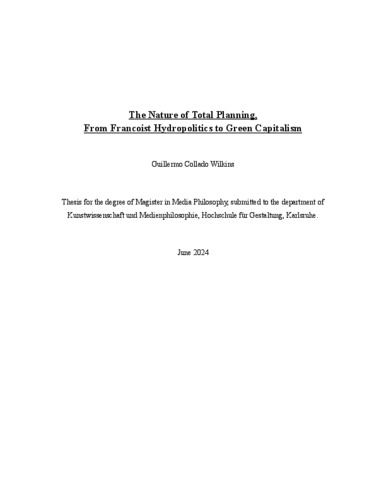The Nature of Total Planning, From Francoist Hydropolitics to Green Capitalism
- Titel
- The Nature of Total Planning, From Francoist Hydropolitics to Green Capitalism
- Titel (en)
- The Nature of Total Planning, From Francoist Hydropolitics to Green Capitalism
- Urheberrechtshinweis
- © Guillermo Collado Wilkins
- Rechtsschutz/Lizenz
- Schlagworte
- Datierung
- 06.06.2024
- Medienersteller/in
- Medien-Beschreibung (en)
- This paper provides a critical examination of ecological planning based on the continuities that it displays across seemingly disparate political projects and historical periods. In order to do so, it draws on the small rural valley of La Bizkaia in Navarre, Spain. It produces an environmental history of the valley through a detailed study of its hydro-forestry resources, periodising such history according to a materialist reading of its ‘metabolic regimes’. That is to say, through the particular configurations between the natural and social orders that dictate life in La Bizkaia.
Initially, the study introduces the valley’s natural characteristics and its property structure, laying the foundations upon which the rest of this paper sits. Subsequently, it undertakes a detailed investigation of Francoist interventions in the 1940s-60s; a massive monoculture of pine trees was planted by the Francoist Forestry Council, which radically undermined La Bizkaia’s natural systems and depopulated it. This paper thus analyses the planning logic behind this natural intervention which, borrowing a term from one of its draftsmen, is named ‘total planning’.
The thesis then explores contemporary management of the valley by the Government of Navarre, which has maintained ownership until this day, aligning its plans with the international protocols and standards characteristic of green capitalism. By looking at projects undertaken in the valley for nature conservation and climate change adaptation, which receive funding from the European Union, this research reveals the continuities between Francoist policies and green capitalism, and how both operate under the logic of Total Planning. Under this planning logic, they both fail to accommodate the unpredictability of political conflict and natural systems.
Planning thus serves as a lens to explore the political and epistemological dimensions of ecological thought, placing a materialist reading of a small case study into the broader context of contemporary ecological intervention.
- This paper provides a critical examination of ecological planning based on the continuities that it displays across seemingly disparate political projects and historical periods. In order to do so, it draws on the small rural valley of La Bizkaia in Navarre, Spain. It produces an environmental history of the valley through a detailed study of its hydro-forestry resources, periodising such history according to a materialist reading of its ‘metabolic regimes’. That is to say, through the particular configurations between the natural and social orders that dictate life in La Bizkaia.
- Alternativ-Text (de)
- Vollständiger Text der Magisterarbeit
- Alternativ-Text (en)
- Complete text of the Magisterarbeit
Projekt/Werk
- Titel des übergeordneten Projekts/Werks
- The Nature of Total Planning
- Autor/in
- Beschreibung (de)
- Magisterarbeit in Medienphilosophie
- Beschreibung (en)
- Thesis for the degree of Magister in Media Philosophy
- Kategorie
- Datierung
- 06.06.2024
- Sprache
- Ort: Institution
- Land
HfG & Archiv
- Projektleiter/in
- Semester
- Studiengang
- Typ der Abschlussarbeit
